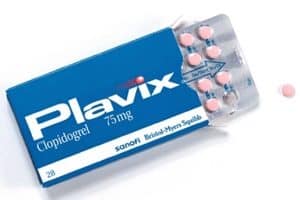
Plavix and PPI Combination Risk. We have long been reporting on the risks associated with proton pump inhibitor (PPI) drugs such as Prilosec, Prevacid, Aciphex, Protonix, and Nexium when taken with the anti-platelet drug, Plavix. Most recently, we discussed the dangers of this combination in heart stent patients. Now, WebMD is reporting that heart attack […]

Plavix and PPI Combination Risk. We have long been reporting on the risks associated with proton pump inhibitor (PPI) drugs such as Prilosec, Prevacid, Aciphex, Protonix, and Nexium when taken with the anti-platelet drug, Plavix. Most recently, we discussed the dangers of this combination in heart stent patients. Now, WebMD is reporting that heart attack patients taking this drug combination experience an increased risk of suffering a second heart attack versus patients not treated with PPIs.
The recent study appears in the March 4 issue of The Journal of the American Medical Association (JAMA).
Plavix is used to prevent blood clots after heart attack or stroke and when certain disorders of the heart or blood vessels are present. Plavix keeps platelets in the blood from coagulating to prevent unwanted blood clots that can occur with certain heart or blood vessel conditions. PPIs treat chronic heartburn.
Web MD cited recent research that substantiated some other, recent trials that point to PPIs inhibiting the blood clotting properties of Plavix (clopidogrel). The studies looked at cardiac patients who took Plavix with a PPI and found those patients experienced a 25 percent increased risk of being hospitalized for cardiac problems over patients only taking Plavix, said P. Michael Ho, MD, PhD, a study researcher from the Denver VA Medical Center, reported Web MD.
“It is increasingly clear that PPIs should not be prescribed to patients taking clopidogrel, unless there is a good indication for doing so,” Ho said to WebMD.
Plavix is typically prescribed, sometimes along with aspirin, to patients following heart attack or to treat other cardiac conditions and to prevent the development of blood clots. PPIs are also typically prescribed to minimize gastric bleeding risks common with blood thinners. Now, studies have found that those patients treated with a Plavix-PPI combination suffer an increased risk for repeat heart attacks and cardiac-related death, reported Web MD.
Ho and his team looked at over 8,000 heart attack and unstable angina patients over the course of three years who were treated at 127 VA hospitals nationwide, said Web MD. All were prescribed Plavix, while 64 percent were also prescribed a PPI, such as Prilosec, Prevacid, Aciphex, Protonix, and Nexium.
During the follow-up, about one-third—30 percent—of those on Plavix and a PPI either died or required hospitalization for a cardiac event, versus 21 percent of patients only taking an anti-platelet, Web MD said. Also, the team found that taking the Plavix-PPI combination at any point in follow-up treatment resulted in a 25 percent increased risk for death or hospitalization.
Timothy Gardner, MD, president of the American Heart Association told WebMD, “If a patient has a history of GI bleeding, we know that can increase the risk of recurrence. It may be that we need to limit the use of PPIs to these patients and other patients who have a clear need for protection.”
Late last year, an analysis of a database kept by pharmacy benefits manager Medco Health Solutions Inc., concluded that the combination of Plavix and PPIs places patients at a greater risk of heart attack, stroke, and other dangerous health problems than those who took ‘Plavix’ alone.
The study followed over 16,000 patients from 2005 to 2006. Of those, 9,862 patients took Plavix alone and 6,828 patients were took Plavix with a PPI. All had been implanted with a heart stent—a wire-mesh tube—that props open arteries after they have been cleared pf plaque.
The study tracked if the patients were hospitalized for heart and circulatory problems within a year of stent implantion and found of those who had not had a previous heart attack, 21.2 percent experienced a serious event within a year of their stent surgery.
That number rose to 32.5 percent among those who took Plavix and a PPI. Of those who did have a previous heart attack, 39.2 percent were hospitalized for a serious heart or circulatory event. For those taking only ‘Plavix’, only 26.2 percent did.
The personal injury attorneys at Parker Waichman LLP offer free, no-obligation case evaluations. For more information, fill out our online contact form or call 1-800-YOURLAWYER (1-800-968-7529).


